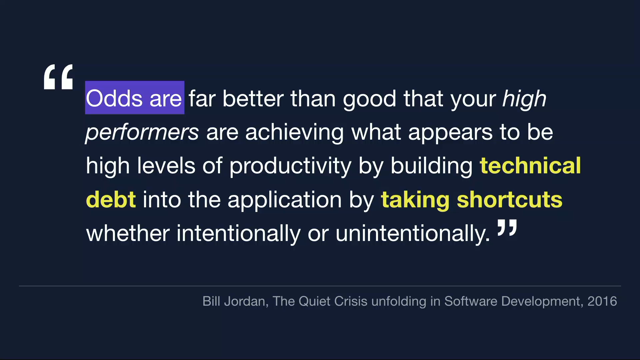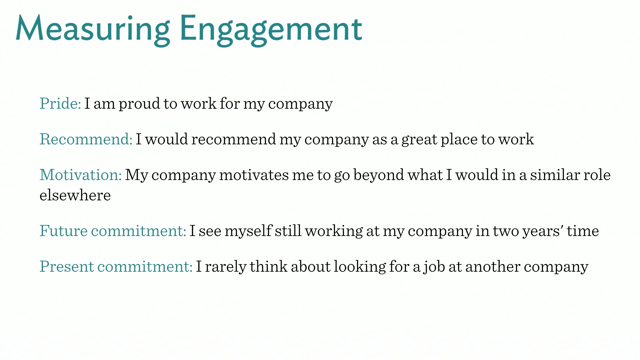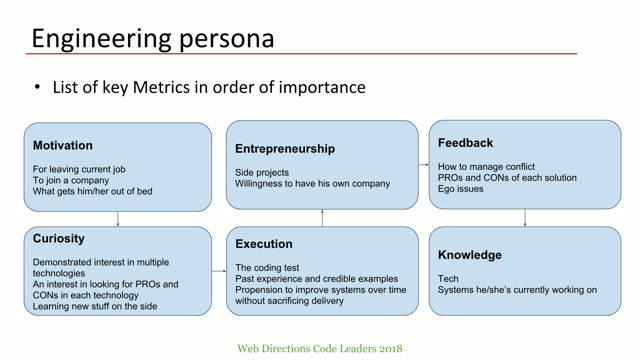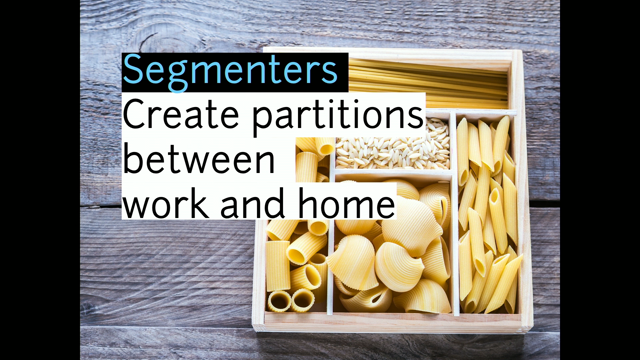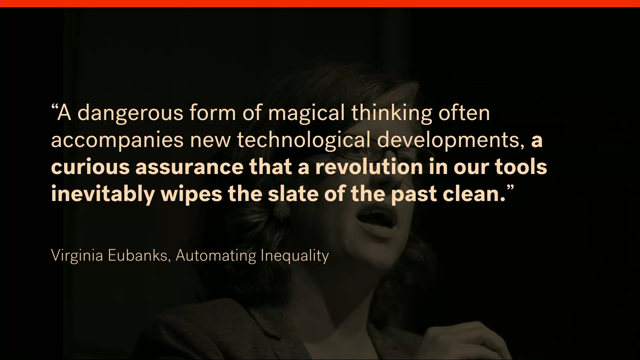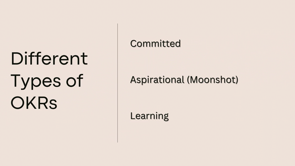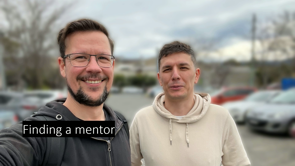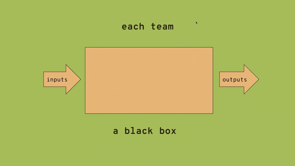The 2,000 year-old engineering manager
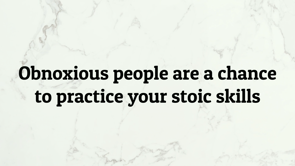
Introduction
In all seriousness, I am the 2000 year old engineer engineering manager because I practice the philosophy of stoicism in terms of how I do leadership. I use stoicism to make sure that I'm more objective, more rational, and not making such rash decisions in the leadership role.
A Day in the Life of Stoicism
This talk is about how you can form a more solid core to how you take on your day to day challenges. Stoicism was really open to anybody to learn about it 2000 years ago. It's a framework that can help you with a lot of things, not just being a good engineering manager.
Be Conscious of Your Emotions
Would they have behaved the same way as what you would have done? That person could be somebody that you look up to, or could even be a TV character. Key part of this is to be conscious of your emotions.
The Importance of Worries
David's job wasn't going very well ten years ago. His partner took him out for dinner to cheer him up. She said, yeah, we're warriors. And in a split second, he thought he was lousy. Eventually, he channeled that warrior and took control of the job.
Stoicism and Judgment
Most of the anxiety and stress that you feel comes from what you believe other people think about you. Some things are within our control and some things are not. Stoicism gives you building blocks to train yourself in this area.
The First of the Stoic Exercises
Stoic exercises train you into thinking about the things that you should be investing your time into. Advice from Stoicism is to be open minded when you're dealing with people. And then the final one is the idea that there are things that happen to us that are really big and important.
Daily Reflection
The second exercise is a daily reflection. The only thing that you can control is your thoughts and your actions. Use a version of this with engineering managers that I work with. At the end of the week, we reflect on how things actually went.
A Little Stoic Exercise for You
The last Stoic exercise is about giving you a perspective on where you are in the world. Know that the things that you hold important are only relatively important to you and know that you are only comparatively important as well. The idea is that you're supposed to see it as a freeing thing.
How to Get Excited About Stoicism
Stoicism has been around so long that during the Renaissance it was having a Renaissance. There's a few books that I'd probably recommend if you want to kick off in it. If you're more into web stuff, then we've got Modern Stoicism.
Thanks folks.
Now you've read the title of the talk, and your possibly thinking, 'man, he looks good for 2000' and I can assure you it's from a, very good skin regime to do with moisturizing a hell of a lot.
But in all seriousness, I am the 2000 year old engineering manager because I practice the philosophy of stoicism in terms of how I do leadership, and I use stoicism in order to make sure that I'm more objective, more rational, and not making such rash, rash decisions in the leadership role that I've got.
But before I get into the talk, I'm actually curious to know if we've got any practicing stoics in the audience today.
Could you raise your hands if you are.
Maybe maybe I knew I was being a bit brave in putting that one out there.
I think that what you'll find is as you listen to the talk is that you'll probably relate to a lot of the messages that are in stoicism.
So if I ask the question at the end, I reckon we might have a few people who might be budding stoics, which is what I am.
So I think we can all agree that the last few years have been a bit crap at the end of the day, whether it's things like floods or layoffs in the tech industry, the pandemic itself almost- forgot about the pandemic.
All of these things contribute to a, sense of anxiety and stress, and these things can leak into the work that we do and actually make it a little bit more challenging than what we might expect.
So, with this backdrop, we're expected to be like good engineers, good engineering managers and things like that.
So this talk is really about how you can form a more solid core to how you take on your day-to-day challenges and how the, you can then use that strong core to project the best qualities that you've got, the best leadership qualities that you might have.
Now, when I first heard about stoicism, it was only a couple of years ago and I really associated it with the phrase to be stoic.
And growing up in '80s Britain, it's really drummed into you.
If you've seen the crown, you get, get it right.
That's what it's like.
It's all about a stiff upper lip and it's all about 'keep calm, carry on', those kinds of things.
So that was my original association with stoicism, was quite negative and not really something that I related to.
But the more that I've learned, the more that I've actually found that it's a really good framework that can help you with a lot of things, not just being a good engineering manager, but with life generally.
It'll help you with everything from missing the, missing a train, or missing a plane all the way through to actually your inevitable death.
Not to make it too heavy this morning, but it runs the full gamut.
So you're probably thinking, all right, Dave.
Dave, what is stoicism?
Give me a bit of a lowdown if it's not this kind of 'to be stoic' thing.
I'll start with the word itself, right?
So the word itself comes from the word 'stoa' in Greece.
And this picture that you can see on the screen at the moment, that is a stoa in Greece, it's a little bit like a marketplace.
So 2000 years ago, this is where stoicism was first taught, and it was really open to anybody to be able to learn about stoicism.
This was at a time when other schools of philosophy were actually closed off to people.
You'd have to be either rich or from a particular part of the society to be able to have a good education.
But stoicism was really open to everybody.
So right from the get go, I like stoicism 'cause it reminds me of what we try and strive for with things like open source software.
So in a bit of a stretch, you can possibly imagine it as the open source philosophy of its time, 2000 years.
Now, when you Google 'Stoicism', you're gonna come across a few familiar faces.
They're always presented as these busts from 2000 years ago, and I'll introduce you to a few of them that I'm gonna use today.
So we've got Zeno.
He's the person who established the initial school of stoicism.
It's actually as a result of being involved in a shipwreck that actually ruined him.
He went on to establish the first school of Stoicism in Greece.
And then we've got Epictetus.
Epictetus really nailed a lot of the foundational kind of ideas of stoicism building off what Zeno had done.
And I draw on Epictetus quite a bit in this presentation later.
And then we've got Marcus Aurelius.
And people may have heard of Marcus Aurelius cause he's a bit like the pinup boy of stoicism, if you can have such a thing.
He was a Roman emperor and he's, like best known for a journal that he wrote called 'meditations' in which he reflected on his, life as a Roman Emperor, but from a stoic perspective.
And he's seen as a good Roman emperor as well, 'cause some of them are a bit dodgy.
Now the interesting thing about these three is you probably sit there and you see them all in their busted form and you're probably thinking that they're all going down the pub talking about stoicism and like thrashing it all out.
But there's actually about 500 years between Zeno and Marcus Aurelius.
So even before we've got to our time, it's already had half a Millennium have been like stress tested and things like that.
So for me, I'm like a bit of a learner stoic at the moment.
Like it's only been something that I've been practicing for a couple of years, but there's definitely two parts of it that really stand out for me.
The first part is the idea of 'what is it to live like a meaningful life?' And then the other part of it is 'how do we respond to the things around us?' So not, again, not to make it, I've already covered death and now I'm covering what's the meaning of life, like, where else can we go from here, right?
But for a stoic to live a meaningful life is to live accord in accordance with nature and to be a virtuous person.
So when a stoic talks about nature, they're not talking they are talking about like trees and plants and pigs and cats and things like that.
But they're also talking about human nature as well, and the fact that we are human and we have flaws.
So stoicism has that built into it, and it's also about this idea of being a virtuous person as well.
So virtues for a, stoic, are like the foundational pillars of stoicism.
So the four stoic virtues that we've got, the first two like self-evident.
You've got self-control, which is something that I'm always thinking about when I'm trying to give up chocolate, is I I should be able to restrain myself when there's an abundance of things.
There's courage, which is when you've got anxiety or strong feelings about something where you're feeling like you shouldn't do something, but it's for the greater good to do it.
Courage is, about overcoming those fears and those concerns.
The third pillar, or third virtue, sorry, is justice.
And justice for stoic is not in the sense of the legal sense of the word.
It's more from the point of view of contributing to the community and giving back.
It's also about not it's not about being too hard on yourself as well, not being too judgmental on yourself.
And then finally, we've got wisdom.
And wisdom is really around the idea that it wraps the other three virtues up and it gives you a sense of what is good, what is bad, and what is indifferent for a stoic.
So a good thing would be exercise in moderation.
When there's an abundance of things and you're feeling a bit greedy, like my chocolate kind of problem that I've got, and a bad thing would be lying to somebody because you are trying to avoid certain responsibilities.
So a stoic believes that they don't control the world around them.
Only how they respond.
And a stoic must always respond with those, four virtues-courage, self-control, justice, and wisdom.
And that underpins everything that Stoic does.
So a big part of this really about being stoic is about being more rational, less reactive, and being conscious of your emotions and the way that you judge things.
So what if I was to tell you that a system that you use every day, and you're probably using it right now kind of relates to all of this how you judge things.
And so that process is the one where you're taking information.
You, think, you run a process over it and it gives you an objective answer out the other side, but it, doesn't at all.
And how do I know that it doesn't?
I know that it doesn't because.
You probably don't want to talk to people.
You don't wanna interact with people too much after you've had one of those coffees out there.
Or you might get a little bit hangry at about 3:30 in the afternoon.
So it's probably not the best time that you should be making decisions.
Or you may have had an interaction with somebody in the morning that's like thrown you off, and then it's permeating through all of the other interactions that you're having throughout the day.
So you've gotta be conscious of these factors.
A big point, a big important part of being stoic is to be conscious of these things.
Another way to think about this is to think about a situation where you've been quite stressed or you've been overly emotional.
Maybe you've reacted badly to somebody.
Maybe you've told them off, something like overly emotional and think about what it would be for somebody else to be in that situation.
Would they have behaved the same way as what you would've done.
That person could be somebody that you look up to or could even be a TV character that you might think of.
How would they respond to the same situation as what you were in?
The only difference between you and them is how they would process the information and then, and then respond to it.
So key part of this is to be conscious of your emotions, be conscious when they're running away from you, and then be conscious of, as well, when you're placing judgment on the things that you're, trying to get through or trying to respond to.
I'll give you this is where I'm gonna do a dramatic pause and a drink of water.
I do apologize.
This is also a mildly embarrassing story about myself, about how I was in a situation where just my own perception of the situation changed my way of thinking, like within a split second.
And so it was about 10 years ago I'd taken a job at a company that was just doing some technology that I was interested in and platforms that I was interested in.
Like it was basically when the iPad was emerging about 10 years ago, and I was a front end developer and I wanted to be involved in that scene.
But the job really wasn't going very well.
I thought that people didn't like me.
I thought that they judged the technical choices that I was making.
'Cause I'm very Web based.
They were very much about objective C and I also felt that I was excluded from a lot of the conversations that were going on, the decisions that were being made.
So my partner, bless her, she decided to take me out for dinner to cheer me.
And one, like a couple of things you should know about us is that I'm from the Midlands in the UK, hence the slight accent that I've got.
And she's born and bred in Sydney.
So there's certain things that we say sometimes, even though we both speak English, that we sometimes misunderstand each other a little bit.
And so anyway, she takes me out for dinner and I tell her all of woes that I've gotten, all the problems that I've got, and then I, what I hear from her is, yeah, 'we are warriors we are warriors'.
And I'm like, yes, I am a warrior.
I'm getting over there.
You know where this is going, don't you?
I am a warrior.
I'm being brave.
I'm trying out this new platform, learning all these new things.
I am doing good things.
I'm gonna get back to that job and I'm gonna kinda take control of the situation.
But then as she's speaking, like it's obvious that she's not talking about a warrior at all.
And I stop her and I say, 'did you say that we're both warriors?' And she says, 'no, we're both worriers.
We worry a lot.' It's oh, you are right about that.
So in that split second, I'd gone from feeling amazing that I could take on the world.
And then the next split second, I thought I was lousy.
So I went back to my malbec and I finished my dinner.
But I did channel that inner worrier eventually, I did take control the, of the job.
So key thing here is about like placing judgment on things and not placing judgment on things so easily.
So like we're all at the conference for the next couple of days, right?
We're all at the conference for the next couple of days, and if you see a slide with some typos in the code, in the syntax that they're writing, Don't rush to judge ... I thought you might like this one.
Don't rush to judge and think 'what the flip, like this person doesn't even know what they're talking about'.
Understand that they may have just made a typo.
Just think, 'oh, that's a typo'.
And there might be a bigger idea that they're, trying to get across.
So it brings me to, like I talked, to a fair bit about judgment there.
I think that's not the best feature of stoicism.
It's just really, being aware of it.
The greatest feature of stoicism, I'm actually gonna refer to Epictetus to help me through this one with you, and I hope that I do oversell this.
'So happiness and freedom begin with a clear understanding of one principle that some things are within our control, and some things are not.
And it's probably something that's quite familiar to people, right?
Like that idea of just do the things that you could, can control.
BUt stoicism goes a little bit further than this, right?
So it also says that most of the anxiety and stress that you feel, not all of it, but most of it actually comes from what you believe other people think about you.
So it's not even what they think about you, it's what you believe that they think about you.
Once you know this, once you see this, you can't unsee it.
You feel it in yourself all the time.
And I also recognize it when I'm dealing with team members, or if I'm dealing with my family, like I see this stuff coming up all the time.
A lot of the anxiety and fear that people have is actually what they think is gonna happen, it's not actually what's happening at all.
So there's a couple of examples.
It might be that you're applying for like a job at a big tech company and they've, rejected you.
And they start to think, man, I'm never gonna get a job ever again.
And there's a fundamental flaw in, in my personality, and I'm never gonna be able to get back from this.
Or, oh, sorry.
Or it may be that like a knowledge share meeting that you've had, like somebody seemed disinterested in the idea that you were putting across and that, and they must have hated the idea that you had.
So the idea here is that should you put all of your energy into that worry for those things that you are concerned about?
Is it gonna get you that job?
Is it gonna change the opinion of the person who you thought was disinterested in the idea that you had?
The answer's no.
Like you can't change any of those things and you can't change them for a whole bunch of reasons.
They're what you think somebody thinks.
And even if it was what somebody think, you can't even control that, and you also they're are also things that are in the past as well.
So you can't change things that are in the past.
What if you start to train, change the way that you think, right?
Start to change the way that you think about those kinds of circumstances.
You train yourself to think nothing bad will happen with those things.
I will get a job again.
It's not gonna be a total disaster.
And that's really what stoicism gives you as well.
It gives you like building blocks and means by which to, to train yourself in this area.
And so if it's all about focusing on what you can control, your next thing is it's David, what is it that I can control?
It's like, that's a good question.
I can go back to Epictetus again to get us a little bit of an insight on this.
So of some things that are in our power and others are not in our power, our opinion, movement towards a thing, desire, aversion in a word, whatever are our own acts.
Not in our power.
Our body, property, reputation, and in a word whatever are not our own acts.
So what this basically boils down to is that the only thing that you can actually control are your thoughts and your actions, and nothing else.
Nothing else.
And you'll probably looking at that and thinking, 'yeah, David, what about the body thing?
Like I go to the gym and I work out and I eat well, and I do all those things.
My body is totally in my control.' But what happens if you get sick or if you if something happens to your body that is outside of your control, but you can't control everything, you can control those things that you do with it, but you can't have full control over it.
So for a stoic, you must spend your time determining what is within your control and what is not, and then invest your efforts into what you can control and remember, that is really just your thoughts and your actions at the end of the day.
So I do, I'm gonna introduce you to the first of the stoic exercises that I've got for you.
I've got three in total.
This one I use every day.
I would've been using it before I came up on stage.
I would've been using it on my way here, like I use it all the time.
And it's very, simple.
So it starts off with, you ask yourself this question, "should I worry about blah?" And then you ask yourself the next question, is it in relation to your character, your actions or reactions, or how you treat others.
If it is, then fantastic.
That's where you place your energy and that's where you can make a change and take action.
If not, then don't worry about it.
It's, pointless.
It's, obviously not as easy as that, but this starts to train you into thinking about these things that you should be investing your time into.
For example, with this talk that I'm given should I worry about what you lot think about my talk?
It's I can't control that.
I can't control what you think about the message that I've got or the topic that I've got, or any of those kinds of things.
So my energy doesn't go there.
My energy goes into making sure that the slides are clear, rehearsing lots, and putting my energy in there to do the best possible conference talk that I can do.
And then what you think about it is, your business at the end of the day.
So stoicism also has lots of other kind of like areas that you can pull on to give yourself advice.
So deals with preparing yourself for, what may come.
So I'll go to, I'll go to Marcus Aurelius with this one.
What do I have to complain of if I'm doing what I was born for, the things I was brought into this world to do?
Or is this what I was created for, to huddle under the blankets and stay warm?
I this quote, cause it makes me think that sometimes Marcus Aurelius would've preferred to have been under the doona watching Netflix rather than getting out and doing Roman Emperor stuff.
But what he's really talking about is that sometimes we just have to get up and out there, and sometimes we're dealing with people that are not the most fun to deal with.
Do you know what I mean.
So whilst we want everybody that we that to like us and be friendly, at the end of the day, that's not how it is.
Some people are nasty and some people are inconsiderate.
And as a stoic, you're meant to, you're not meant to meet this with anger or upset, even though it's so tempting to do that sometimes.
You're supposed to meet it with the virtues that I spoke about earlier.
So for example, if you meet an obnoxious person, you're supposed to meet them with self-control and with kindness, not bite their head off even though you want to, even though you want to.
A strategy that Marcus Aurelius had here was to, if he was facing somebody that he couldn't quite see eye to eye with, he would start to think about what is like the broader life of that person?
What are they doing at home?
Are they playing with their kids?
Are they eating dinner?
Imagining them in lots of different scenarios.
And the idea is that when you do face something, which is like an obstacle for you with a person that you think, oh, this thing that we've got a problem with, it's not their entire life and there may be something that's going on that I'm not too aware of.
And so the idea is to be just a little bit more open mind in terms of when you're dealing with people.
There's another side to this as well, is that you can never be sure of things so, something that appears wrong to you when someone is, coming to you and you feel like this is not the right thing from their point of view, it might be completely right and you can never be sure 100% about that.
So the advice from stoicism is to be open-minded when you're dealing with things, even when you disagree with what you are talking about.
And then the final one from stoicism on this area is the idea the things that happen to us that seem really big and important and anxiety causing stress inducing.
They're actually things that happen to people every day.
You're not gonna be the first person to experience this thing, and you're not gonna be the last person to experience this thing.
So, stoics, foster an attitude of these things happen.
So no matter how bad it is, chances are, it's just something that's gonna happen to somebody else at some point anyway as well.
So when you're offended by someone, you're supposed to ask yourself, is this the is this the only obnoxious person in the world?
And the answer of that is, of course it's not.
There's heaps of them.
There's probably billions of obnoxious people.
And it's really seen as an opportunity to practice your stoic skills.
Think of it as like, like 300 BC Pokemon.
You've found an obnoxious person and now you can take on.
So the second exercise I've got for you is a daily reflection.
This one this one is something that I used a lot during the pandemic and I would be guilty of getting up in the morning, picking up my phone, getting on Twitter or email and just letting the whole world in.
And when you're doing that, you're passing judgment on things, and generally speaking at the moment, it's bad, is the judgment that you place.
So the daily reflection is designed to like effectively combat that, right?
So, when you wake up in the morning, don't just jump straight onto your phone.
Contemplate what you're trying to do with the day.
Think about what's gonna come up.
It might be in the form a to-do list of things that you want to get through.
Think about what you wanna achieve through that day.
What are the important goals that you're trying to get through?
Think about how others may behave.
So you've got this list of things to do.
What are the interactions that you're gonna have through the day?
And how are people likely to respond to the things that you are gonna be doing.
But always keep in mind that the only thing that you can control, even though you can think about those things, the only thing that you can really control is your thoughts and your actions, the things that you do.
Everything else is uncontrollable.
Second side to the to the daily reflection is at the end of the day, give yourself a little bit of time to reflect on what happened.
Think about what actually happened.
Did you get through those things that you thought, did something else come up that trumped one of the things that you thought was gonna be important?
Do you just forget to do something?
How far from your original intention was the day.
And with your interactions with others, how did you behave?
Did you behave in like a stoic fashion, like a, using those virtues, or did you fly off the handle on things?
So I apply this with some of the engineering managers.
I think in my original kind of write up it says about doing this subtly use a version of this with engineering managers that I work with.
We do it on a weekly basis.
So at the beginning of the week, encourage the engineering managers to just plot out what is it that you're trying to do this week.
And then at the end of the week we'll reflect on how things actually went.
And I find this really useful personally because sometimes like you start off on Monday and you've got all of these good intentions.
By Wednesday, sometimes I'm like, what the hell was I gonna do again?
And I can come back to what we originally talked about with a, when we had a clearer head in terms of where we wanted to go, and recenter myself at that point.
So with all of the stuff that I've spoken about so far, you probably think, ah, stoicism sounds a little bit like self-centered, and maybe it could breed apathy.
But that's not true at all.
Remember I, spoke earlier about the virtues and justices about community and things like that.
But Hierocles is a, stoic philosopher from, about the time of Marcus Aurelius.
He, argued that it was natural to be a little bit selfish with things or be a little bit closed off to really only think about like your friends and your family and that kind of, stuff.
But he reasoned that as a stoic you should be able to reach beyond that to think about reaching more and more people, your actions should benefit the largest amount of people that you possibly can.
And what he meant by that was he should, you should start to see strangers as friends and start to treat friends as family.
And he visualized this as a series of, circles.
So starting with the self then family.
Fellow citizens, which we'd probably think of more as community nowadays, countrymen and mankind.
Now, I apologize for the language here.
It's a bit dated, but you get the general idea of what he's talking about.
The idea here for him was to bring these circles closer and closer to you, and so you'll benefit in the largest groups that you possibly can.
Now I think about this in terms of some of the work structures that we possibly work within.
So if you're operating with something like the Spotify model you might think about it something like this.
You might think about yourself, you might think about your team, you might think about your tribe, you might think about your chapter and you might think about the organization overall.
Now, a few years ago when I was a just first starting out as an engineering manager, I was very like team and tribe centric, and I'd almost have this rivalry with my chapter, my other engineering managers.
But what I've learned since then, like putting this through a bit of a stoic lens is that I really missed opportunities to be able to align what I was doing with my teams, with what other engineering managers were doing with theirs.
So I start to treat other engineering managers more like my team members, and I often refer to it as, thinking as the, of the engineering manager chapter, as being the primary team.
And what I mean by that is I'm trying to bring the other engineering managers closer to me so we can align on the engineering initiatives that we're trying to get, over the line.
So I've got the last stoic exercise for you, and with this one I'm gonna want it to, I'm gonna want you to close your eyes eventually.
So I know that some of you might be a bit cynical, but remember that we're stoics, we're not cynics.
But what this exercise is about giving you a perspective on where you are in the world.
So if you'd all close your eyes and indulge me in that, would be awesome.
Now, I can't tell you exactly what to imagine, but imagine that you are high above the earth in space.
It's lovely and quiet out there.
There's no Slack there's no GitHub issues or anything like that.
It's beautiful.
Starlink doesn't work where we are at the moment.
Now bring yourself closer to the earth.
You're coming through the clouds and you're starting to see people around the world and they're doing the things that people do, right?
So they might be the first kid writing his first hello world script in Python.
Might have a person making some art.
Might be wars being waged.
Could be a person in a traffic jam, could be sitting at a conference at a round table with people that you don't know.
Think about all of these things.
And observe them, but you don't judge those things that are going on.
Now, think of yourself in relation to all of these things.
Know that the things that you hold important are only relatively important to you, and know that you are only relatively important as well.
So you can open your eyes now.
The point of that exercise is to show you that the things that you are really stressed about, some of the decisions that you've got going on, they're only relatively important to you, or might be relatively important to the company.
From like a timescale point of view, it's probably not that big a deal.
And the idea here is that you're supposed to be able to see it as a freeing thing, to not feel so much pressure to make those decisions.
So now I might have got you excited about stoicism maybe, and if I have got you excited about stoicism, have I taught you nothing about stoicism?
That was a stoic joke, by the way.
That's my third stoic joke this afternoon.
Oh, this morning.
If you wanna learn more, there's so much information on this, right?
Stoicism has been around so long that during the Renaissance it was having a Renaissance.
It's been around 2000 years, right?
So there's a lot of material floating around.
For me there's a few books that I probably recommend if you want to kick with it.
So this one, Lessons in Stoicism, which is a Penguin book.
You can probably knock it over in an afternoon, and it gives you a bit of a whirlwind tour of stoicism going into more depths than, what I've covered here.
There's this book by Darren Brown called Happy, which is actually the first book that I, listened to it as an audio book.
It's very much from like a British perspective, and it's got some really engaging exercises and things that you can do.
And then we've got more of an Australian perspective, if that's what you want with Bridget Delaney's, 'Reasons not to Worry'.
She's a journalist.
Again, a really engaging book to read and it takes you on her journey through stoicism.
There are like the classic texts that you can go and look at, like Marcus Aurelius's meditations, but I'd actually recommend starting with something like this where it interprets it for you and gives you advice and, a bit of an idea of what the journey looks like.
If you're more into Web stuff, then we've got Modern Stoicism.
They run Stoic Week every year where you get to practice stoicism as a group, and then they run studies to see its benefits, which is quite cool.
And then we've also got the Daily Stoic, which is probably the most famous modern stoic kind of artifact in the moment.
This is Ryan Holiday's website.
He's written a lot of books on stoicism and it's very much from like more of a US perspective.
Thank you very much.
A large part of our roles as engineering leaders is how we relate to the people we work with. For many managers, this brings in anxiety and stress – What will people think of me? How do I keep myself and my team focused on the important tasks? How do I know if we’re making progress toward our goals? How can I view challenges from another perspective to help guide the team?
In 2021 I found that many answers to these questions have come by practising easy-to-follow Stoic exercises and using Stoicism to help shape how I approach my work. In this presentation, I’ll share what those exercises are, how I’ve applied them to my work as an Engineering Manager, and how I’ve subtly applied them to how others work with me.
